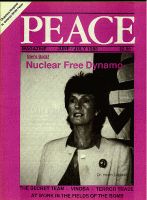
Peace Magazine Jun-Jul 1988, page 21. Some rights reserved.
Search for other articles by Peter Langille here
Is Canada tacitly supporting preparation for a nuclear war? An alternative: Dissuade aggression by making it too costly.
What leads peace researchers to focus on new strategies for ensuring national defence? On the one hand, some people are fearful that disarmament would leave them defenceless and that profits, economic opportunities, and stature would be lost. Nuclear disarmament, it is argued, would only be conceivable with a massive conventional rearmament. On the other hand, many people fear that the dangers of nuclear and conventional war are increasing and that the arms race is an intolerable waste of human and global resources. New conventional weapons of mass destruction are seen as an unacceptable alternative.
It may now be possible to reconcile these two conflicting positions. There are ways to bolster defence and security while creating the conditions that should make disarmament possible or even inevitable. The underlying idea of non-offensive defence (NOD) is that powers should relinquish their offensive capability in order to let their military means conform with their defensive ends. NOD shares some of the objectives of traditional defence - to dissuade deliberate aggression by making it prohibitively costly for an aggressor to attain a military victory.
Aside from just dissuading aggression, in order to attain the international confidence for disarmament and security, nations would require defences that were structured to pose less threat to other states. As well, it is no longer cost-effective or safe to retain any association with offensive military capabilities or provocative defence arrangements. Whereas defences that rely on offensive power and nuclear threats tend to promote fears, hostilities, and reciprocal reactions such as an arms race, a defensively oriented defence promotes confidence, stability and common security. Defence and defence alone, in the narrow sense of policing, protecting sovereignty, defending within one's own territory, and working to maintain international peace and stability are the only justifiable rationales for military capabilities. Within the structures of NOD, the entire combination of military arrangements, alliances, strategies and weapons must be assessed to decide whether a military posture is consistent with the requirements of keeping up non-offensive defence.
The advantages of a NOD posture are clear. First, it is conducive to good long-term relations with other countries; second, it removes any justification for a pre-emptive strike or even being targeted by a potential enemy; third, it would establish firm criteria by which a government could forestall some of the destabilizing trends arising with new strategic developments; fourth, it is a defence posture compatible with the foreign policy I goals of confidence-building, nuclear disarmament, and the limitation of various kinds of offensive conventional weaponry.
Three particular developments support the consideration of a NOD posture for Canada. First, our territory has acquired new strategic importance; second, Canada has a unique opportunity to mediate the superpower relationship by asserting sovereignty and enforcing a security buffer between the superpowers; third, our armed forces are being drawn into provocative arrangements that exacerbate international tension and increase the probability of conflict. Indeed, our security depends on our ability to limit the destabilizing activities of either superpower on our country.
It is within Canada's means to deny both superpowers a wider range of military options. A Canadian NOD posture would emphasize dissuasion, vigilance, and the denial of Canadian territory for any activities that could seem offensive or destabilizing. By defending Canadian territorial sovereignty and restricting foreign military presence on our territory, the Armed Forces could contribute significantly to our common security. Opting for a NOD posture would help to put our own house in order. By supporting NATO's nuclear strategy and preparation for a protracted non-nuclear war fighting capability, Canada is creating a destabilizing atmosphere. Our declared intention of purchasing nuclear attack submarines, our involvement in SDI and the Air Defence Initiative, confirm our tacit support for further preparations for a nuclear war. Such policies jeopardize the credibility of Canada's declared commitment to the preservation of international peace and stability. However, there is no overpowering reason why Canada must pursue such a dangerous path. We can take a better road to security. A commitment to a NOD posture would establish firm criteria by which the Canadian Government could forestall some of these destabilizing developments.
IN SHORT, THE Canadian military could more effectively protect Canadian security and promote international security by shifting to an independent, territorial-based non-offensive defence posture. Our defence activities must be compatible with our long term objectives. This approach would be consistent with Canada's commitment to peacemaking, constructive internationalism, the United Nations, nuclear disarmament, and the building of international trust and confidence. The roles and requirements are within our means.
Peter Langille is a researcher and graduate student in Ottawa.

Peace Magazine Jun-Jul 1988, page 21. Some rights reserved.
Search for other articles by Peter Langille here